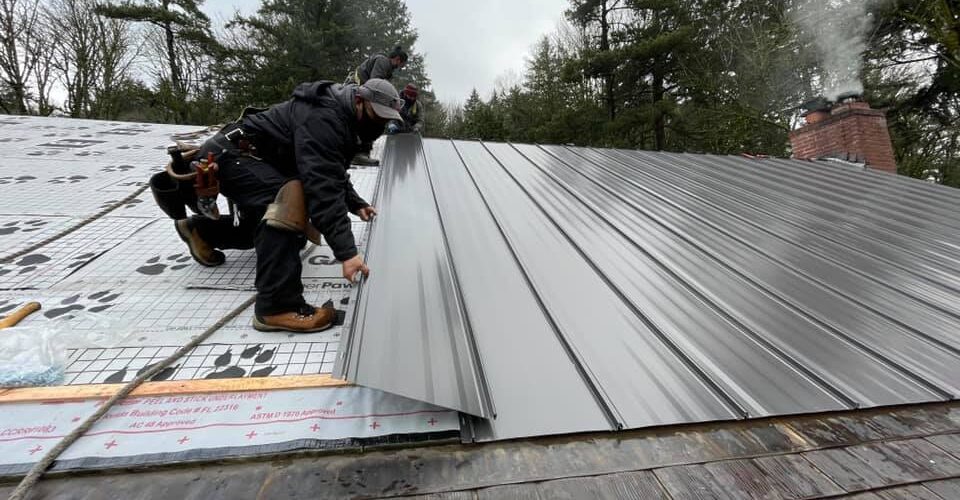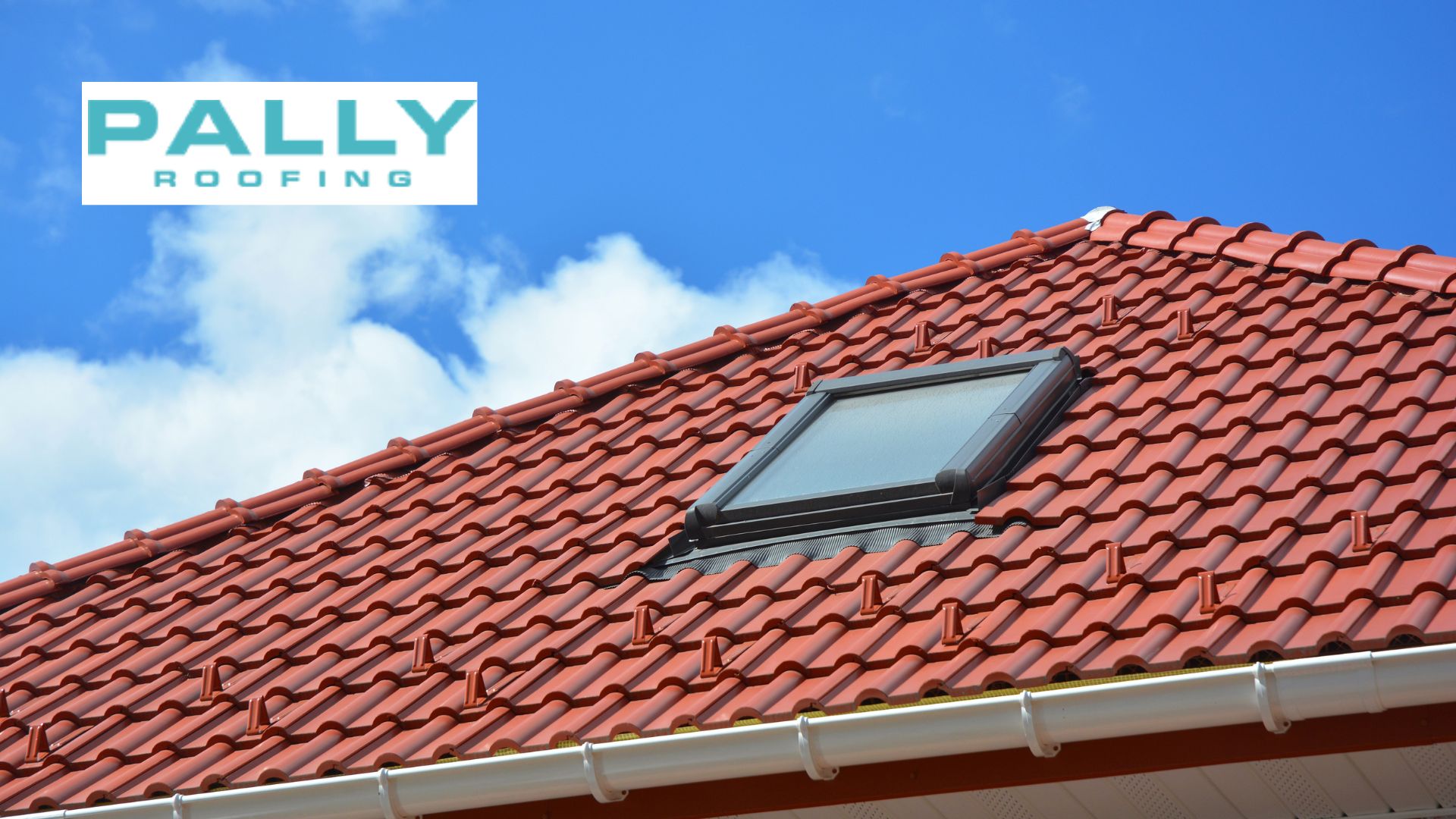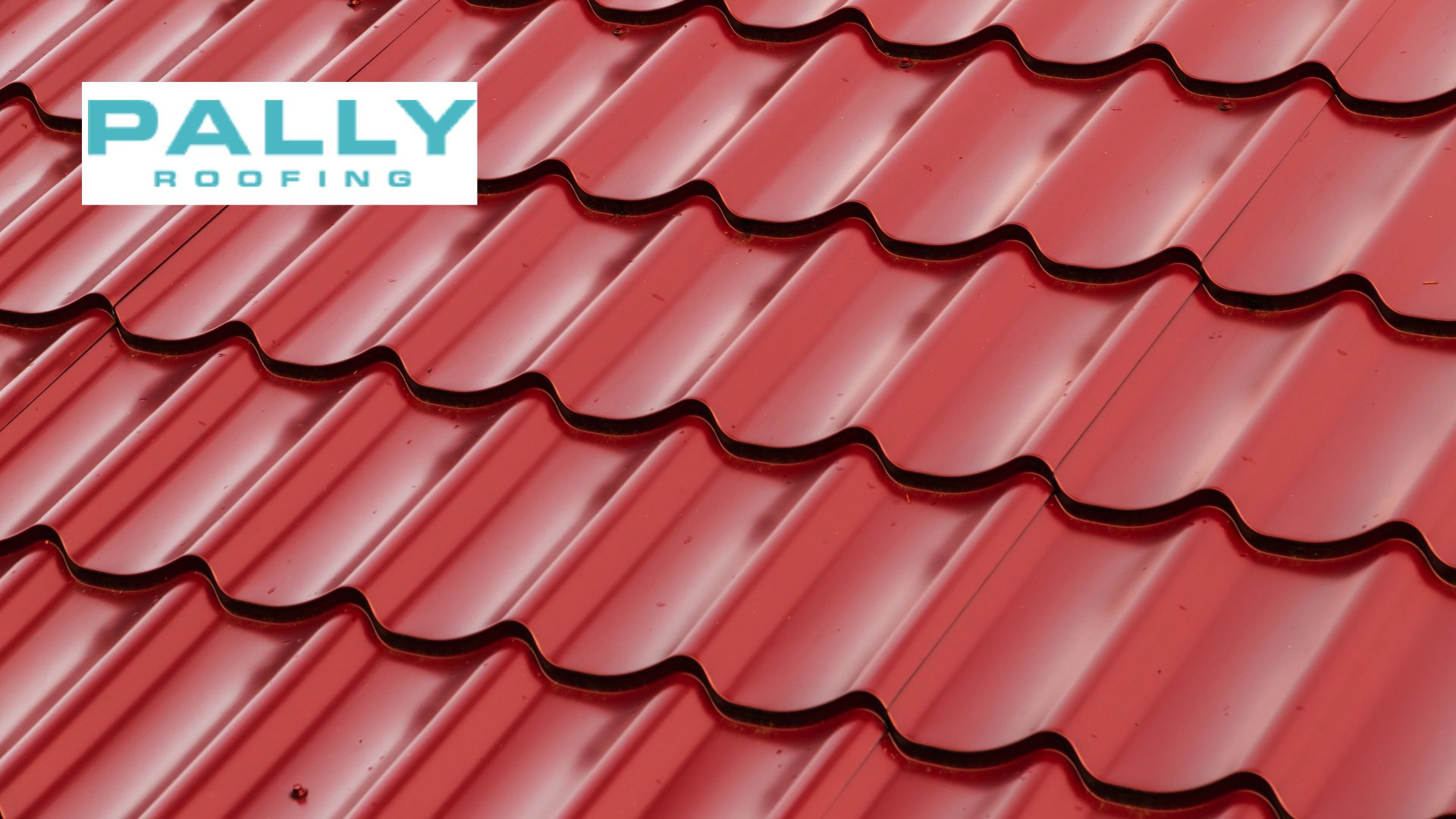Last updated on January 7th, 2025 at 05:49 pm
Metal roofing has emerged as a leading choice for homeowners and businesses seeking longevity, energy efficiency, and aesthetic appeal in their roofing solutions. With its robust durability and ability to withstand harsh weather conditions, metal roofing offers a reliable option for protecting your property for years to come.
However, understanding metal roofing installation costs is paramount for making informed decisions and ensuring a successful roofing project.
At Pally Roofing, we understand the importance of comprehensive roofing solutions tailored to meet your specific needs. As a trusted roofing company serving Ohio, we specialize in a wide range of services, including metal roofing installation, asphalt roofing installation, gutter installation, and repair.
In this comprehensive guide, we’ll delve into the various factors that influence metal roof costs and provide valuable insights into effectively utilizing metal roof cost calculators.
Understanding Metal Roof Cost Calculator
What is a metal roof estimate, and why is it important?
A metal roof estimate is an approximation of the total cost associated with installing a metal roof on a property. It encompasses various factors such as material costs, labor expenses, additional features, and any other relevant considerations. Essentially, a metal roof estimate gives homeowners and contractors a clear understanding of the financial investment required for their roofing project.
Several key factors influence metal roof estimates, each playing a crucial role in determining the overall cost of the project:
Material Type: The type of metal roofing material chosen, such as steel, aluminum, copper, or zinc, significantly impacts the cost. Each material has its own unique properties, durability, and aesthetic appeal, which are reflected in the pricing.
Roof Size: The size and complexity of the roof directly affect the amount of materials needed and the labor required for installation. Larger roofs typically incur higher costs compared to smaller ones.
Labor Costs: The cost of labor for installing the metal roof is another significant factor. This includes the skill level of the roofing contractors, labor hours required, and any additional services such as roof preparation or removal of old roofing materials.
Additional Features: Specialized features such as insulation, ventilation systems, skylights, or complex architectural designs can impact the overall cost of the project.
Accurate metal roof estimates are essential for several reasons
Budgeting: By providing a clear breakdown of costs upfront, accurate estimates enable homeowners and contractors to budget effectively for the project, avoiding financial surprises or overruns.
Planning: Accurate estimates allow for proper planning and scheduling of the roofing project, ensuring that materials and resources are available when needed and minimizing delays.
Decision-Making: Reliable estimates empower clients to make informed decisions about their roofing options, including selecting the right materials and choosing between different installation methods or additional features.
Transparency: Transparent and precise estimates foster trust and confidence between the roofing company and the client, laying the foundation for a positive and collaborative working relationship.
At Pally Roofing, we prioritize accuracy and transparency in all our metal roof estimates. Our commitment to delivering precise and detailed assessments ensures that our clients have complete confidence in the cost and scope of their roofing projects, allowing them to proceed with peace of mind and certainty.

Utilizing Metal Roofing Cost Estimators
Step-by-step guide on using metal roof cost estimators effectively
Choose a Reliable Estimator: Start by selecting a reputable metal roofing cost estimator tool that is user-friendly and provides comprehensive results. At Pally Roofing, we offer a state-of-the-art cost estimator, designed to simplify the estimation process and provide accurate projections for your roofing project.
Input Parameters: Enter the necessary details into the estimator, including the roof size, material type, geographical location, and any additional factors relevant to your project. Our estimator at
Customize Options: Some estimators offer customization options to account for specific features or preferences, such as insulation, ventilation, or skylights. Take advantage of these options to fine-tune the estimate according to your desired specifications and budget constraints.
Review Results: Once you’ve entered all the necessary information, review the results generated by the estimator. Pay close attention to the cost breakdown, which typically includes material costs, labor expenses, and any additional fees or taxes.
Compare Estimates: If you’re considering different roofing materials or contractors, use the estimator to compare estimates and determine the most cost-effective option for your needs. Keep in mind that the lowest estimate may not always be the best choice – consider factors such as quality, reputation, and warranty coverage when making your decision.
Seek Professional Guidance: If you have questions or concerns about the estimate or need assistance interpreting the results, don’t hesitate to reach out to a professional roofing contractor for guidance. At Pally Roofing, our team of experts is always available to provide personalized advice and recommendations based on your specific circumstances.
Understanding the output: interpreting cost breakdowns, including material costs, labor expenses, and total project estimates:
Material Costs: This portion of the estimate outlines the expenses associated with the roofing materials, such as metal panels, fasteners, underlayment, and trim. Understanding the material costs allows you to assess the quality and durability of the materials being used and make informed decisions about your investment.
Labor Expenses: Labor costs encompass the fees charged by the roofing contractor for installing the metal roof, including labor hours, overhead, and profit margins. By understanding the labor expenses, you can evaluate the expertise and professionalism of the contractor and ensure that you’re receiving fair and competitive pricing for the services rendered.
Total Project Estimate: The total project estimate provides an overview of the overall cost of the roofing project, including both material costs and labor expenses. This figure is a crucial benchmark for budgeting and planning purposes, allowing you to allocate resources effectively and avoid financial surprises during installation.
Types of Metal Roofing Materials and Their Costs
Overview of common metal roofing materials: steel, aluminum, copper, and zinc
Metal roofing offers a wide range of options to suit different aesthetic preferences, budgets, and performance requirements. Some of the most common metal roofing materials include:
Steel: Steel is one of the most popular choices for metal roofing due to its durability, affordability, and availability in various finishes and coatings. It offers excellent resistance to corrosion and is suitable for a wide range of climates.
Aluminum: Aluminum roofing is lightweight, corrosion-resistant, and highly durable, making it an ideal choice for coastal areas or regions with high humidity. It offers superior resistance to rust and is available in a variety of colors and styles.
Copper: Copper roofing is renowned for its timeless beauty and natural patina that develops over time, giving it a unique and elegant appearance. While copper roofing tends to be more expensive upfront, its longevity and aesthetic appeal make it a worthwhile investment for discerning homeowners.
Zinc: Zinc roofing offers exceptional durability and resistance to corrosion, making it an ideal choice for harsh environmental conditions. It develops a protective layer of zinc carbonate over time, known as zinc patina, which further enhances its resilience and aesthetic appeal.
Tips on Choosing the Right Size and Type of Metal Roof for Your Project
When it comes to choosing the right size and type of metal roof for your project, there are several important factors to consider. Firstly, it’s crucial to take accurate measurements of your roof to ensure you select the appropriate size. You’ll also need to think about the type of metal you want, as each type comes with its own unique benefits and drawbacks. For example, steel is strong and durable, but it may rust over time. Aluminum, on the other hand, is highly resistant to corrosion but may not be as strong as other metals.
Comparative analysis of material costs, durability, and aesthetic appeal
When comparing metal roofing materials, it’s essential to consider factors such as cost, durability, and aesthetic appeal to determine the best option for your specific needs:
Cost: Steel roofing tends to be the most affordable option among metal roofing materials, making it a popular choice for budget-conscious homeowners. Aluminum and zinc roofing typically fall into the mid-range price category, while copper roofing is the most expensive due to its premium quality and aesthetic appeal.
Durability: All metal roofing materials offer excellent durability and resistance to elements such as wind, rain, hail, and UV exposure. However, the longevity of each material may vary depending on factors such as coating quality, installation techniques, and environmental conditions.
Aesthetic Appeal: The aesthetic appeal of metal roofing materials varies widely, with options ranging from traditional and timeless to modern and sleek. Steel and aluminum roofing comes in a wide range of colors, finishes, and profiles to complement any architectural style.
How material choice influences overall project costs and long-term maintenance expenses
The choice of metal roofing material can significantly impact both the upfront costs and long-term maintenance expenses of a roofing project:
Upfront Costs: While steel roofing tends to be the most cost-effective option upfront, copper roofing is the most expensive due to its premium quality and aesthetic appeal. Homeowners should consider their budget constraints and desired aesthetics when selecting a metal roofing material.
Long-Term Maintenance: While all metal roofing materials offer excellent durability and low maintenance requirements compared to traditional roofing materials, factors such as coating quality and environmental conditions can influence long-term maintenance expenses.
Conclusion
Utilizing metal roof cost calculators is key to making informed decisions and budgeting effectively for roofing projects. These tools empower homeowners and contractors to assess their options, understand the financial implications, and plan accordingly.
At Pally Roofing, we’re committed to delivering top-tier roofing solutions that prioritize quality, reliability, and customer satisfaction. From accurate estimates to expert installation and ongoing maintenance, we’re your trusted partner every step of the way.
Contact us today to learn more about our services and experience the difference that Pally Roofing can make for your property. With our expertise and dedication, you can trust us to deliver exceptional results that exceed your expectations.
Author
-

With more than 16 years of hands-on experience, Phillip Schmucker is the knowledgeable owner of Pally Roofing. His dedication to superior roofing services has earned him a reputable place in the industry. Phillip also shares his extensive expertise through writing, providing readers with practical tips and professional advice on various roofing topics. Follow him on LinkedIn.
View all posts







